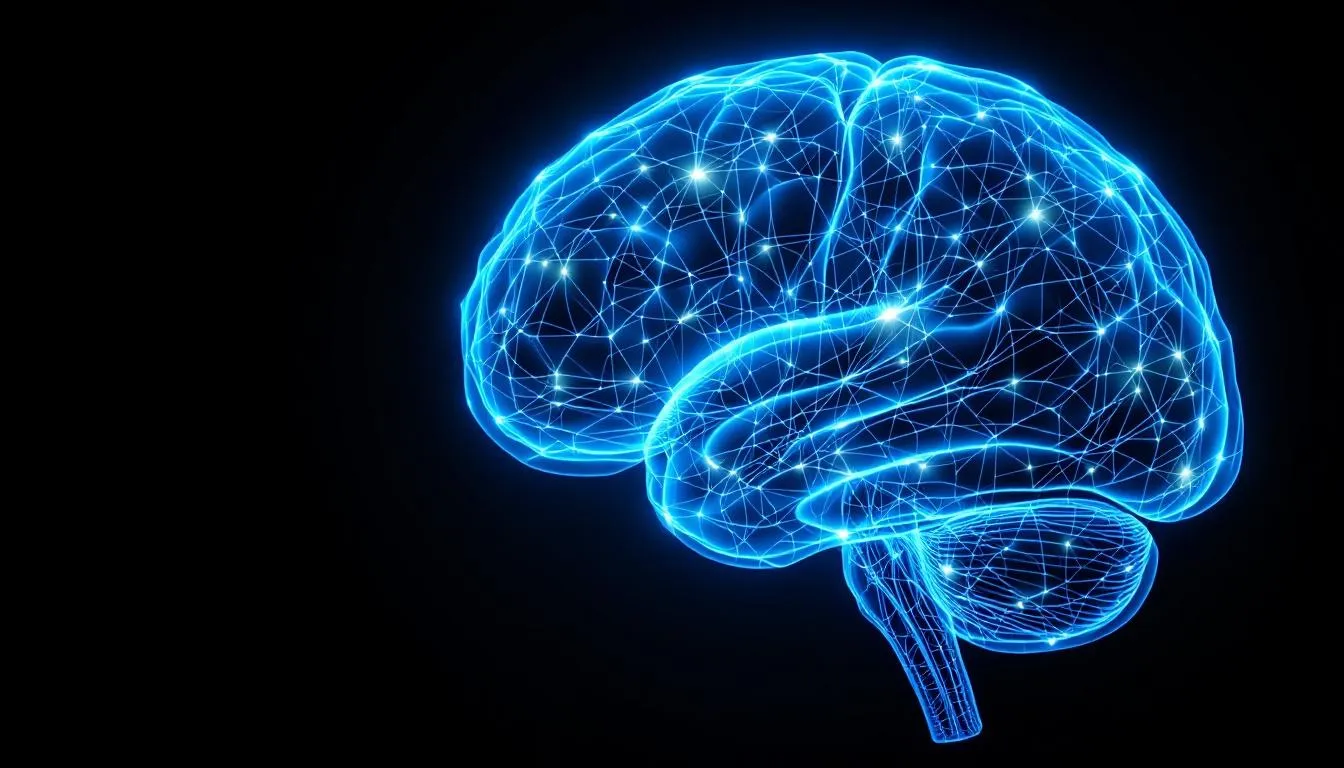Magnesium For your Brain: Essential Mineral for Cognitive Health and Neurological Function

Your brain depends on magnesium for virtually every cognitive process, yet studies reveal that approximately 50% of Americans are magnesium deficient, with this number rising to 80% among elderly populations. This widespread deficiency represents a silent crisis affecting millions of people’s cognitive function, mood regulation, and long-term brain health.
Magnesium plays a fundamental role in over 300 enzymatic reactions throughout the human body, with the central nervous system being particularly dependent on adequate magnesium levels. As the fourth most abundant cation in the mammalian body and the second most abundant intracellular cation after potassium, magnesium serves as a critical cofactor in neural communication, neurotransmitter regulation, and neuroprotection.
This comprehensive guide explores the intricate relationship between magnesium and brain health, examining how this essential mineral supports cognitive function, protects against neurodegenerative disorders, and offers practical strategies for optimizing your magnesium status through both dietary sources and targeted supplementation.
How Magnesium Supports Your Brain Health

Magnesium serves as a fundamental building block for optimal brain function, acting as nature’s calcium channel blocker and maintaining the delicate balance required for proper neural communication. The mineral’s role extends far beyond basic cellular function, encompassing critical processes that determine cognitive performance, emotional stability, and neurological health.
As a natural calcium antagonist, magnesium regulates neurotransmission by controlling calcium flow through ion channels. This regulation prevents excessive neuronal excitation, which can lead to cellular damage and contribute to various neurological disorders. The blood brain barrier carefully controls magnesium concentrations, maintaining levels around 0.66 ± 0.14 mM in cerebrospinal fluid to ensure optimal neural function.
Research indicates that magnesium deficiency affects approximately 68% of Americans, with particularly high rates among those experiencing high blood pressure, celiac disease, and kidney disease. This widespread deficiency has profound implications for brain health, as even mild reductions in magnesium status can impair cognitive performance and increase susceptibility to mood disorders.
Magnesium’s neuroprotective properties stem from its ability to stabilize cell membranes, regulate energy metabolism, and maintain proper neurotransmitter balance. The mineral plays a crucial role in supporting brain cells against oxidative stress and inflammatory damage, two key factors in cognitive decline and neurodegeneration.
The average daily magnesium intake falls significantly short of recommended levels, with most people consuming only 50-60% of their daily needs through their regular diet. This deficiency gap has created a population vulnerable to brain-related symptoms including memory problems, difficulty concentrating, mood instability, and increased stress sensitivity.
The Science Behind Magnesium and Brain Function
Magnesium’s influence on brain function operates through multiple sophisticated mechanisms that affect everything from basic cellular energy production to complex neurotransmitter networks. The mineral serves as a cofactor in enzymatic reactions essential for ATP synthesis, protein synthesis, and DNA repair within brain cells.
One of magnesium’s most critical roles involves modulating NMDA (N-methyl-D-aspartate) glutamate receptors, where it acts as a voltage-dependent blocker preventing excessive glutamate activity. This mechanism protects neurons from excitotoxicity, a process where overactivation of glutamate receptors leads to neuronal cell death. Simultaneously, magnesium enhances GABA (gamma-aminobutyric acid) neurotransmitter activity, promoting calming effects and reducing neural hyperexcitability.
Research demonstrates that adequate magnesium concentrations support brain derived neurotrophic factor (BDNF) production, a protein essential for neuroplasticity, learning, and memory formation. Studies show that elevating brain magnesium through targeted supplementation increases synaptic plasticity and improves cognitive performance in both healthy individuals and those with mild cognitive impairment.
Magnesium homeostasis varies significantly across different brain regions, with higher concentrations found in areas responsible for memory formation and emotional regulation. This regional distribution reflects the mineral’s specialized roles in supporting specific cognitive functions and emotional processing.
Magnesium and Neurotransmitter Balance
The relationship between magnesium and neurotransmitter systems forms the foundation of the mineral’s mood-regulating and cognitive-enhancing properties. Magnesium plays a direct role in dopamine synthesis and regulation, affecting motivation, reward processing, and motor control. Low magnesium levels can disrupt dopamine pathways, contributing to symptoms commonly seen in ADHD and depression.
Serotonin production also depends on adequate magnesium status, as the mineral serves as a cofactor in enzymes responsible for serotonin synthesis. This connection explains why magnesium supplementation often improves mood and reduces anxiety symptoms. Clinical studies demonstrate that magnesium treatment can significantly reduce depression scores and improve overall emotional well-being.
The mineral’s influence on stress hormones represents another crucial aspect of its neurological function. Magnesium helps regulate the hypothalamic-pituitary-adrenal (HPA) axis, reducing cortisol production and blunting the stress response. This regulation protects brain tissue from chronic stress-induced damage and supports resilience against anxiety and panic disorders.
Magnesium’s role in neuroplasticity extends beyond neurotransmitter balance to include structural changes in neural networks. Research shows that adequate magnesium levels promote dendritic branching, increase synaptic density, and enhance long-term potentiation (LTP), the cellular basis of learning and memory formation.
Magnesium Deficiency and Brain Health Consequences

Magnesium deficiency manifests in the brain through a cascade of symptoms that can significantly impact quality of life and cognitive performance. Early signs include persistent brain fog, difficulty concentrating, memory problems, and increased susceptibility to stress. These symptoms often develop gradually, making them difficult to recognize as magnesium-related issues.
Chronic low magnesium triggers persistent neuroinflammation, characterized by elevated inflammatory cytokine production and increased reactive oxygen species formation. This inflammatory state damages brain cells and disrupts normal neural communication, contributing to cognitive decline and accelerating brain aging.
Studies reveal that individuals with neurological disorders consistently show reduced concentrations of magnesium in both serum and brain tissue. The deficiency creates a self-perpetuating cycle where inflammation increases magnesium losses while simultaneously increasing the body’s magnesium requirements for proper immune function and cellular repair.
The connection between magnesium deficiency and mental health conditions has been extensively documented in clinical research. Low magnesium status significantly increases the risk of developing anxiety disorders, depression, ADHD, and panic attacks. Children and adolescents with ADHD often show markedly reduced serum magnesium levels compared to their neurotypical peers.
Magnesium deficiency also impacts sleep quality and circadian rhythm regulation, creating additional stress on cognitive function. Poor sleep quality associated with low magnesium levels compounds cognitive impairment and reduces the brain’s ability to perform essential maintenance functions during rest periods.
The mineral’s deficiency can trigger muscle cramps and tension, which indirectly affects cognitive performance by creating physical discomfort and distraction. Additionally, magnesium-deficient individuals often experience increased sensitivity to noise, light, and environmental stressors, further compromising their cognitive resources.
Magnesium’s Role in Preventing Neurodegenerative Diseases
Emerging research reveals magnesium’s protective effects against common neurodegenerative disorders, with particularly promising evidence in alzheimer’s disease prevention and management. Studies demonstrate that individuals with higher magnesium intake show significantly reduced risk of developing cognitive decline and maintain better brain health as they age.
In alzheimer’s disease, magnesium deficiency contributes to the formation of amyloid beta plaques and tau protein tangles, the hallmark pathological features of the condition. Adequate magnesium levels help prevent these protein aggregations while supporting cellular mechanisms that clear existing plaques from brain tissue.
Research on Parkinson’s disease reveals that magnesium supports dopaminergic neuron health and may slow disease progression. The mineral’s neuroprotective properties help preserve motor function and reduce the severity of movement-related symptoms. Clinical observations suggest that Parkinson’s patients with higher magnesium status experience slower disease progression and better quality of life.
Multiple sclerosis research indicates that magnesium supplementation may help manage symptoms and reduce inflammatory activity in the central nervous system. The mineral’s anti-inflammatory properties and ability to stabilize neural membranes contribute to reduced symptom severity and improved neurological function.
Vascular dementia, the second most common form of dementia, shows strong associations with magnesium status. The mineral’s cardiovascular benefits, including blood pressure regulation and improved blood flow, help maintain adequate cerebral circulation and reduce the risk of vascular-related cognitive decline.
Clinical Studies and Brain Health Outcomes
Controlled clinical trials provide compelling evidence for magnesium’s cognitive benefits across various populations. A landmark study involving older adults with mild cognitive impairment showed that magnesium l threonate supplementation improved memory performance by 15% over a 12-week period compared to placebo groups.
Long-term epidemiological studies tracking thousands of participants over decades reveal that individuals with higher magnesium intake maintain larger brain volumes and show less age-related brain atrophy. These findings suggest that adequate magnesium status may help preserve brain structure and function throughout the aging process.
Research on magnesium’s anti-inflammatory effects demonstrates significant reductions in inflammatory markers including tumor necrosis factor alpha and other pro-inflammatory cytokines following magnesium treatment. These reductions correlate with improved cognitive performance and reduced symptoms of brain fog and fatigue.
Clinical trials examining magnesium supplementation in traumatic brain injury patients show accelerated recovery and improved neurological outcomes. The mineral’s neuroprotective properties appear to reduce secondary injury and support brain healing processes following trauma.
Studies investigating magnesium’s impact on stress-related cognitive impairment consistently demonstrate improvements in attention, working memory, and executive function following supplementation. These benefits appear most pronounced in individuals with initially low magnesium status or high stress levels.
Best Forms of Magnesium for Brain Health

Not all magnesium supplements provide equal benefits for brain health, as different forms vary significantly in their ability to cross the blood brain barrier and reach neural tissue. Understanding these differences helps optimize supplementation strategies for cognitive enhancement and neuroprotection.
Magnesium l threonate stands out as the most brain-specific form of magnesium, engineered specifically to enhance blood brain barrier penetration. Research shows that magnesium l threonate increases brain magnesium concentrations by approximately 15% more effectively than other magnesium salts. This enhanced bioavailability translates to superior cognitive benefits, particularly for memory formation and learning capacity.
Magnesium glycinate offers high bioavailability with additional calming properties derived from the amino acid glycine. This form provides excellent support for stress reduction, sleep quality, and anxiety management while maintaining good absorption rates. The glycine component enhances GABA neurotransmitter activity, creating synergistic effects for relaxation and mood stability.
Magnesium taurate combines magnesium with the amino acid taurine, providing dual benefits for both cardiovascular health and neurological function. This form particularly benefits individuals with high blood pressure or cardiovascular concerns, as taurine supports heart health while magnesium provides neuroprotective effects.
Magnesium citrate, while primarily known for digestive benefits, offers moderate bioavailability and can contribute to overall magnesium status. However, its brain-specific benefits are limited compared to more specialized forms. Magnesium sulfate and magnesium chloride show even lower bioavailability for brain health applications.
Magnesium oxide, despite being widely available and inexpensive, provides poor absorption and minimal brain health benefits. The body absorbs only 10-15% of magnesium from oxide forms, making them inefficient choices for addressing cognitive concerns or neurological symptoms.
Dosage and Timing for Optimal Brain Benefits
Optimal magnesium supplementation for brain health requires careful consideration of dosage, timing, and individual factors that influence absorption and utilization. The recommended daily allowance suggests 320mg for women and 420mg for men, but therapeutic dosages for cognitive enhancement may require higher amounts under professional guidance.
For cognitive enhancement, research supports dosages ranging from 200-400mg of elemental magnesium daily, preferably divided into two doses to optimize absorption. Taking magnesium supplements with meals improves absorption while reducing the risk of digestive upset that can occur with higher doses.
Timing plays a crucial role in maximizing magnesium’s brain benefits. Evening supplementation supports sleep quality and allows for overnight tissue repair and regeneration. Morning doses can enhance focus and cognitive performance throughout the day, particularly when combined with other brain-supporting nutrients.
Individual magnesium needs vary based on factors including stress levels, physical activity, medication use, and underlying health conditions. Individuals taking diuretics, proton pump inhibitors, or certain antibiotics may require higher magnesium intake to maintain optimal levels. Kidney disease patients should consult healthcare providers before increasing magnesium intake.
Serum magnesium testing provides limited insight into true magnesium status, as the body maintains tight control over blood levels even when tissue stores are depleted. Red blood cell magnesium or magnesium loading tests offer more accurate assessments of true magnesium status for therapeutic decision-making.
Gradual dose escalation helps minimize digestive side effects while allowing the body to adapt to increased magnesium intake. Starting with 100-200mg daily and gradually increasing over several weeks optimizes tolerance and absorption while monitoring for cognitive improvements.
Natural Sources of Brain-Healthy Magnesium

Obtaining magnesium through magnesium rich foods provides the most bioavailable and synergistic approach to supporting brain health. Leafy green vegetables lead the list of excellent sources, with spinach providing approximately 157mg of magnesium per cooked cup, while Swiss chard offers similar quantities along with additional brain-supporting nutrients.
Nuts and seeds represent concentrated sources of bioavailable magnesium. Almonds provide about 80mg per ounce, pumpkin seeds offer 150mg per quarter cup, and cashews deliver 75mg per ounce. These foods also supply healthy fats and proteins that support neurotransmitter synthesis and brain structure.
Whole grains contribute significantly to daily magnesium intake when they replace processed alternatives. Brown rice, quinoa, and whole wheat products maintain their natural magnesium content, while processed grains lose up to 80% of their original magnesium during refining.
Dark chocolate emerges as both a pleasurable and practical source of magnesium, providing approximately 65mg per ounce along with flavonoids that support cognitive function. Choosing chocolate with at least 70% cacao content maximizes both magnesium and antioxidant benefits.
Legumes including black beans, chickpeas, and lentils provide substantial magnesium quantities while offering fiber and plant proteins. A cup of cooked black beans delivers about 120mg of magnesium along with folate and other B vitamins essential for brain health.
More magnesium rich foods include avocados (58mg per fruit), bananas (32mg each), and fatty fish like salmon and mackerel. Even soy milk provides a modest magnesium contribution at 61mg per cup, making it a useful option for those following plant-based diets.
Food processing and modern agricultural practices significantly impact magnesium content in foods. Soil depletion from intensive farming reduces the mineral content of crops, while food processing removes naturally occurring magnesium. Choosing organic, minimally processed foods helps maximize dietary magnesium intake.
A healthy diet emphasizing Mediterranean-style eating patterns naturally provides higher magnesium intake through its emphasis on vegetables, nuts, whole grains, and fish. This dietary approach supports not only magnesium status but overall brain health through multiple nutritional pathways.
Maximizing Magnesium Absorption for Brain Health
Optimizing magnesium absorption requires understanding the complex interplay between nutrients, lifestyle factors, and physiological processes that influence how effectively the body utilizes this essential mineral. Several key strategies can significantly enhance magnesium bioavailability and its subsequent brain health benefits.
Vitamin D status directly impacts magnesium absorption and utilization, with adequate vitamin D levels improving magnesium uptake in the intestines. Conversely, magnesium deficiency can impair vitamin D metabolism, creating a cycle that requires addressing both nutrients simultaneously for optimal brain health outcomes.
Vitamin B6 serves as an important cofactor in magnesium transport and cellular utilization. Ensuring adequate B6 intake through food sources or dietary supplements enhances magnesium’s effectiveness in supporting neurotransmitter synthesis and cognitive function.
Adequate protein intake supports magnesium absorption and provides amino acids necessary for neurotransmitter production. However, excessive protein can increase magnesium losses through urine, requiring balance in dietary planning.
Several substances can significantly inhibit magnesium absorption and should be separated from magnesium-rich meals or supplements. High-dose calcium supplements compete with magnesium for absorption pathways, while excessive fiber intake can bind magnesium and reduce bioavailability. Phytates found in grains and legumes also inhibit absorption, though proper preparation methods like soaking and sprouting can reduce these effects.
Caffeine and alcohol increase magnesium losses through urine, requiring higher intake in individuals who regularly consume these substances. Chronic stress similarly depletes magnesium stores while increasing physiological demands for the mineral.
Optimal timing of magnesium intake relative to other nutrients maximizes absorption. Taking magnesium supplements away from high-fiber meals and calcium-rich foods improves uptake. Combining magnesium with omega-3 fatty acids may enhance both nutrients’ brain health benefits through synergistic mechanisms.
Digestive health plays a crucial role in magnesium absorption, with conditions like celiac disease, inflammatory bowel disease, and small intestinal bacterial overgrowth significantly impairing uptake. Addressing underlying digestive issues often improves magnesium status and subsequent cognitive benefits.
Medications including proton pump inhibitors, diuretics, and certain antibiotics can deplete magnesium or impair absorption. Individuals taking these medications may require higher magnesium intake or more bioavailable forms to maintain optimal levels.
Practical Implementation: Getting Started with Magnesium for Brain Health

Implementing an effective magnesium strategy for brain health begins with honest assessment of current magnesium status through symptom evaluation and dietary analysis. Creating a simple checklist of magnesium deficiency symptoms helps identify potential deficits before they significantly impact cognitive function.
Begin by tracking your current magnesium intake for one week using a food diary app or nutritional tracking tool. Most people discover they consume far less magnesium than recommended, often falling 200-300mg short of optimal intake levels.
Assessing all the magnesium lost through various factors provides insight into individual needs. High stress levels, intense physical activity, excessive sweating, alcohol consumption, and certain medications all increase magnesium requirements beyond standard recommendations.
The best magnesium supplement choice depends on individual goals and tolerance. Those primarily seeking cognitive enhancement should consider magnesium l threonate for its superior brain penetration. Individuals dealing with stress, anxiety, or sleep issues may benefit more from magnesium glycinate’s calming properties.
Starting with dietary modifications provides the foundation for improved magnesium status. Gradually increasing consumption of leafy green vegetables, nuts, seeds, and whole grains establishes sustainable habits while providing synergistic nutrients that enhance magnesium’s benefits.
Supplementation should begin conservatively to assess tolerance and effectiveness. Starting with 100-200mg of elemental magnesium daily, taken with food, minimizes digestive side effects while allowing evaluation of cognitive improvements over 2-4 weeks.
How much magnesium individuals need varies considerably based on age, health status, stress levels, and activity levels. Working with healthcare providers helps establish personalized targets and monitoring protocols for optimal safety and effectiveness.
Monitoring improvements requires tracking both subjective symptoms and objective measures. Keep a simple daily log noting energy levels, sleep quality, stress tolerance, concentration ability, and mood stability. Many people notice initial improvements within 1-2 weeks of adequate magnesium intake.
Blood pressure monitoring provides an additional objective measure, as magnesium supplementation often produces modest but meaningful reductions in both systolic and diastolic pressure. These cardiovascular benefits support brain health through improved blood flow and reduced vascular stress.
Gradual dose increases every 2-3 weeks allow for finding the optimal individual dose while maintaining good tolerance. Most people achieve maximum cognitive benefits with 300-400mg daily of highly bioavailable forms, though some may require higher amounts under professional guidance.
Long-term success requires integrating magnesium optimization into broader brain health strategies. Combining adequate magnesium intake with regular exercise, stress management, quality sleep, and other brain-supporting nutrients creates synergistic effects that maximize cognitive benefits.
Regular reassessment every 3-6 months helps adjust magnesium strategies based on changing life circumstances, stress levels, and health goals. This adaptive approach ensures continued optimization of brain health benefits while maintaining safety and effectiveness.
Creating accountability through tracking apps, health journals, or working with healthcare providers increases adherence to magnesium protocols. Many people benefit from monthly check-ins to assess progress and adjust strategies based on results and experiences.
Support brain health by recognizing that magnesium optimization represents just one component of comprehensive cognitive wellness. Integrating magnesium strategies with other evidence-based approaches including proper nutrition, regular exercise, stress management, and social engagement creates the foundation for lifelong brain health and cognitive vitality.
Better brain health begins with small, consistent steps toward optimizing magnesium status through both dietary and supplemental approaches. By understanding magnesium’s crucial role in neural function and implementing practical strategies for optimization, individuals can support cognitive performance, emotional stability, and long-term neurological health throughout their lives.
Oh!Mg Relax. Dream. Repair.
Your body and mind crave balance, especially after long, demanding days. Oh!Mg was scientifically formulated to help you unwind, sleep deeply, and wake restored. This advanced multi-pathway magnesium complex combines three highly bioavailable forms of magnesium (bisglycinate, taurate, and lactate) with L-Theanine, Lemon Balm, Zinc, and B vitamins, creating a complete nighttime recovery formula for your brain, muscles, and nervous system.
Where most supplements stop at basic magnesium, Oh!Mg goes further, supporting relaxation through GABA activity, stabilizing stress hormones, and replenishing the minerals your cells depend on for calm and repair. The result is a smoother mind, a more restful sleep, and a morning that feels lighter.
Packaged and third-party tested in the UK within a GMP and ISO9001 certified facility, Oh!Mg is vegan, halal, and non-GMO, offering complete transparency and purity because your peace of mind deserves the same care as your body.




Leave a comment